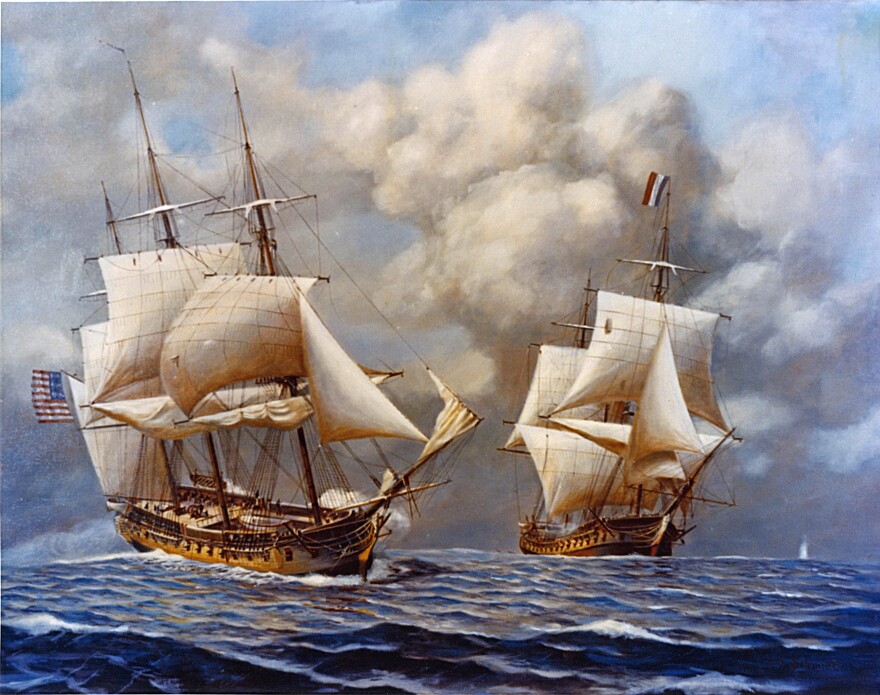On a recent gray day in Portland, a small group of people gathers at a garage to open a box they’ve waited years to see.
It’s a late chapter in a saga that began more than two centuries ago, a story of justice twice denied — or at least delayed — for an African-American Mainer.
But we’re getting ahead of ourselves.
William Brown was likely born a slave in Maryland, but he later settled in Portland, which was then a part of Massachusetts. In 1799, when Brown was barely an adolescent, he enlisted in the U.S. Navy and he played a role in its first major victory. It started with a hot trade dispute with France that became known as the Quasi-War.
“The Quasi-War broke into an outright shooting war at sea in the early days of Feb. 1799, when the USS Constellation met the French frigate L’Insurgente off of St. Kitts and Nevins Islands,” says Herb Adams, a Portland native steeped in Maine and U.S. history.
Adams says Brown served in that battle as what was then called a “powder monkey,” or, as Adams calls it, a powder boy.
“That is, he being small would race barefoot from belowdecks up to deck to the men fighting the guns during battle with leather buckets full of black gun powder. And had to keep this routine, up down up down, as long as the battle lasted,” he says.
Adams says it lasted about an hour and a quarter.

“The French frigate pulled down its flag and lost its mast in disarray and surrendered to the Americans,” he says. “It made Capt. Thomas Truxtun of the Constellation an instant and enormous American hero.”
But it forever scarred Brown, as a shipmate would later attest.
“In the engagement,” the shipmate said, “Brown was wounded in consequence of the discharge of a musket in the top of the enemy’s vessel, entering the foot at the ankle and breaking the bones of the foot.”
That testimony was submitted to Congress some four decades after the battle, in an effort to help the now infirm Brown win recognition for his service and a military pension. The archives show that a number of Mainers would join Brown’s petitions: other shipmates, doctors and surgeons who swore to Brown’s long-term disability, pension agents and big-shot Portland lawyers — including then-Sen. Hannibal Hamlin, later Abraham Lincoln’s vice president, who wrote of his good character and truthfulness.

“It was his service that was in question and not his color. This man lived and limped all his life, working as a sea cook on the ocean, and on land he was a cart man — that is, he’d haul things from A to B, never able really to walk well, and regaling children in Portland about his stories of life at sea because the Congress wouldn’t listen to him,” Adams says.
But Brown hit some major roadblocks. He was told that because the Quasi-War was never officially declared, no pensions would be offered for service before 1800. His name didn’t appear in military records. Papers were lost, letters unreturned. Congress adjourned before acting. More than a decade passed between Brown’s first attempt to get a pension and the day it was won.
“And eventually in 1854 in August he was granted a pension of $96 a year by the U.S. Congress. Unfortunately he had died in May 1854 — his pension arrived after he had died,” Adams says.

And Brown’s story might have ended here, where he was buried, in Portland’s old Eastern Cemetery. But for the past several years Adams and a handful of like-minded Portlanders have made it their business to identify African-American citizens who were interred anonymously in this quiet 5-acre swath of grass and gravestones overlooking the sea.
They’ve focused on those who served in the early wars.
“They could not, if they were a soldier, be buried beside a white man they had fought beside, such were the days. And therefore this area tends to be fairly open, because of course they as a general rule could not have afforded stones,” Adams says.
Four years ago, Larry Glatz, a Maine historian, chanced upon the National Archives’ trove of Quasi-War documents, misfiled under the War of 1812. He notified Adams of Brown’s story, and the two sleuthed their way to an application to the federal and state governments for a veteran’s headstone.
As with Brown’s original pension request, this one too was a stop-and-go affair.
“Government then, government now — you know there’s paperwork, there’s bureaucracy,” Adams says.
But Glatz was dogged, offering proofs of Brown’s service, making repeat requests, following up, making calls, answering questions. And finally, late last month, they got the news — the V.A. had dropped off a new headstone for Brown at a city garage.
It’s made of white Vermont marble, about waist-high and narrow, like the headstones at Arlington National Cemetery.
“The stone is inscribed very simply,” says Glatz, who was on hand as the inscribed piece was unwrapped at the garage. “William Brown, USS Constellation, 1786-1854.”
Sometime this spring, the headstone will be set in the section of the old city cemetery once reserved for its African Americans.
“He fought for a country that didn’t recognize him appropriately in the short life that he had and he is still one of us, and we owe him this,” Adams says.
To see more documents from the National Archives, click here.


